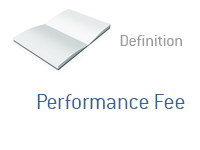Definition of Performance Fee
What is a "performance fee" as it applies to the world of hedge funds? What is the definition of the term "performance fee"?
Hedge funds typically charge two different types of fees - management fees and performance fees.
If you have ever seen a term such as "2 and 20" or "2 and 25" when reading up about hedge funds, you are seeing the management and performance fees that the hedge funds charge.
In the case of "2 and 20", for instance, the "2" is the management fee, while the "20" is the performance fee.
 A "performance fee" means that the hedge fund will keep a percentage of the profits. So, if a hedge fund generates $100 million in returns over the course of a year, the fund would keep a percentage of these returns as their "performance fee". So, if they had a 20% performance fee, they would keep $20 million.
A "performance fee" means that the hedge fund will keep a percentage of the profits. So, if a hedge fund generates $100 million in returns over the course of a year, the fund would keep a percentage of these returns as their "performance fee". So, if they had a 20% performance fee, they would keep $20 million. Hedge funds utilize a high water mark in order to keep things fair for their investors. For instance, let's say that a hedge fund starts with $100 million in investor assets, and they end up losing $20 million in their first year. If they make $20 million in returns in their second year, it wouldn't be fair for them to charge a performance fee on that $20 million. So, they would only start charging the fee once they went over the $100 million high water mark.
--
While the 20% performance fee is fairly standard in the industry, some of the more successful hedge funds charge upwards of 30%.
--
Davemanuel.com Articles That Mention Performance Fee:
SAC Capital Now In the Crosshairs of the Government?
Are Hedge Fund FoFs on the Way Out?
What Is A Fund of Hedge Funds?
Bill Fleckenstein to Close Short-Only Hedge Fund, Open Long-Short Fund
Andrew Lahde Flips Wall Street The Bird, Rides Off Into Sunset
